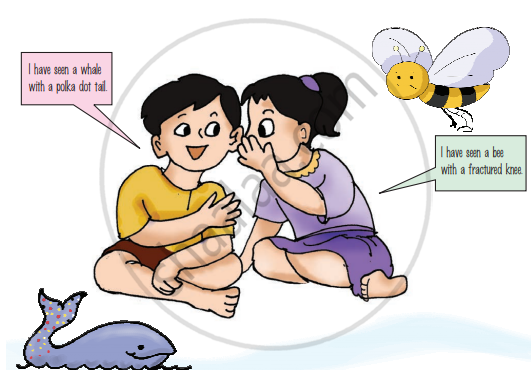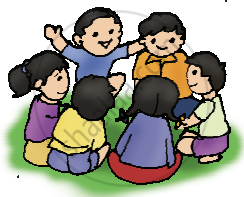Advertisements
Advertisements
प्रश्न
Listen and tell the sounds that these words in the poem produce.
- cart ______
- drinks ______
Can you make these sounds?
उत्तर
Do it yourself.
APPEARS IN
संबंधित प्रश्न
A close family bond is like a ______.
List of __________ trains will appear.
She got her mobile in January.
Santhiya always talks on her mobile to her friends.
Shorter bird vocalizations are ______.
Do you know where the rarest and the most beautiful shells are found?
Listen to the passage carefully and write the answer.
Fleming’s thought at breakfast
Sir Alexander Fleming, who discovered penicillin, was once forced into an interview in New York by two journalists just as he was about to have breakfast. One of them asked him, ‘Sir, what are you thinking about right now? We wish to know what a great scientist think while getting ready for breakfast’. Fleming mused a while on the question and he replied, ‘I am thinking of something very special. The journalist, who were all ears, drew themselves forward. ‘I am thinking, whether to have one egg or two.
- Name the scientist.
- What did he discover?
- Who approached the scientist?
- What was the question asked by the journalist?
- When did they meet the scientist?
Nandhu pressed a button.
Listen to the weather report. Read the questions given below, then listen to the weather report again and fill in the blanks.
- Which season does the weather report show? ______
- What kind of a day is it? ______
- What is the temperature stated in the report? ______
- Tomorrow it may probably ______
- The weather report suggests to use ______.
Listen to the audio and answer the following.
Did Shabeena go to Jacklin's house?
- Yes
- No
Fun with sounds
| pleasure | treasure | - | measure |
| wear | tear | - | - |
| stare | where | - | - |
| planned | canned | scanned | strand |
| topsy-turvy | hurly-burly | hurly-burly | curly-whirly |
Say the words aloud one by one. Follow the instructions and move your body accordingly.
| Shoulders | Move them up and down. |
| Feet | Walk forward and backward. |
| Run | Fast and slow. |
| Hands | Move them left and right. |
Let your partner talk about or copy those sounds.
Whisper a secret in your partner’s ear. The partner will in turn whisper his secret in your ear.

Now talk about the secret aloud.
Form a circle and whisper a secret into the ear of the person on your right. He in turn whispers into the ear of the person on the right. Pass the secret on till it goes around the circle. The last person will tell the secret aloud. Is the secret the same as what the first child had whispered?

In small groups one child will give directions orally only once; the others will listen and hunt for the following:
Listen to these instructions and follow them
- naughty walk
- naughty walk forward backwards
- fall down
- do a funny trick
- walk on tiptoes
- drag your feet
- spin around
- jump like a horse
- walk with your shoes
- shuffle your feet
Read and listen to these two poems with your partner and find out what are the things that the village child and the city child like.
|
The Village Child My home is a house Near a wood I'd live in a street If I could! I do wish someone Lived near. There's no one to play with At all. The trees are so high And so tall: And I should be lonely For hours, Were it not for the birds And the flowers. |
The City Child I live in a city In a street; It is crowded with traffic And feet; There are buses and motors And trams. I wish there were meadows And lambs. The houses all wait In a row There is smoke everywhere That I go. I don't like the noises I hear I wish there were woods Very near. |
First, read the following statements. Then, listen to the passage read aloud by your teacher or played on the recorder and complete the statements. You may listen to it again, if required.
There are many answers to this question. Firstly, 1 would say that we owed much to the work of previous climbers on Everest: to the experience and know ledge they passed on, and to the fact that they had gone on trying and had never given up hope.
Next, I w ould place the careful and thorough planning done before the climb began. On the Everest, a large number of people have to do different things in different places at the same time. Unless every detail had been worked out in advance, things would quickly have gone wrong.
The third reason was the excellence of our equipment. In particular, our oxygen apparatus was very important, and it worked well. Without it. we could not have reached the summit.
Our own fitness played a big part in the climb, and this was due to our periods of training, in which we got used gradually to great heights: and to our food; and to the care and attention we received from our doctors.
Above all else, I should like to mention how well we worked together. That was the biggest single reason why we got to the top. In the four months we were together we lived and worked as a team. Not everyone could climb to the top. Some of the members had jobs to do on other parts of the mountain; jobs that were less exciting than climbing to the summit, but just as dangerous and uncomfortable. But everyone played his part to the full. That was the biggest thing of all.
In the same way, our Sherpas were magnificent. Without our tents, our oxygen, our food, our climbing gear, the summit could not have been reached. And without the Sherpas, we could
not have lifted all this equipment, which weighed 750 lb., up to 26,000 feet, ready for the assaults. No praise is too high for these cheerful and
gallant men.
Finally, there was the weather. For five weeks we had bad weather; then, after the middle of May, we were lucky. It no longer snowed, and even the wind sometimes dropped.
Complete the following.
a) List any three aspects which contributed to the success of the ascent of the summit.
- ______
- ______
- ______
b) Without the help of ______nothing would have been possible.
c) The main idea of the passage is ______.
d) The biggest thing of all is ______.
e) ______were cheerful and gallant men.
